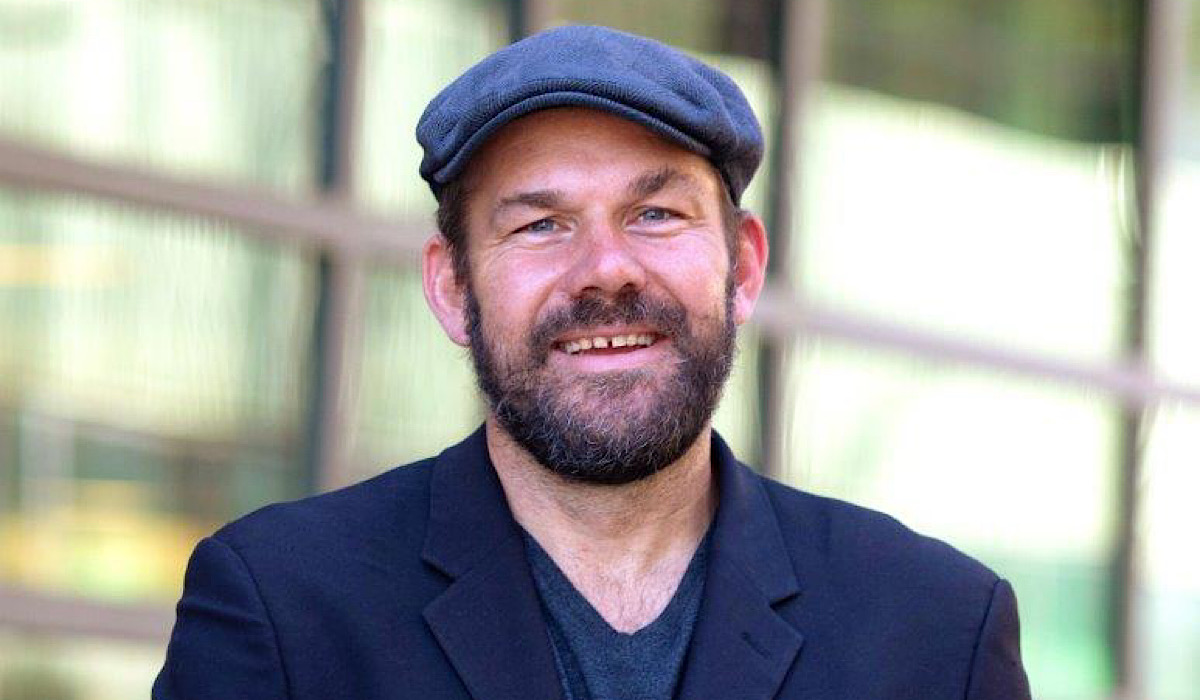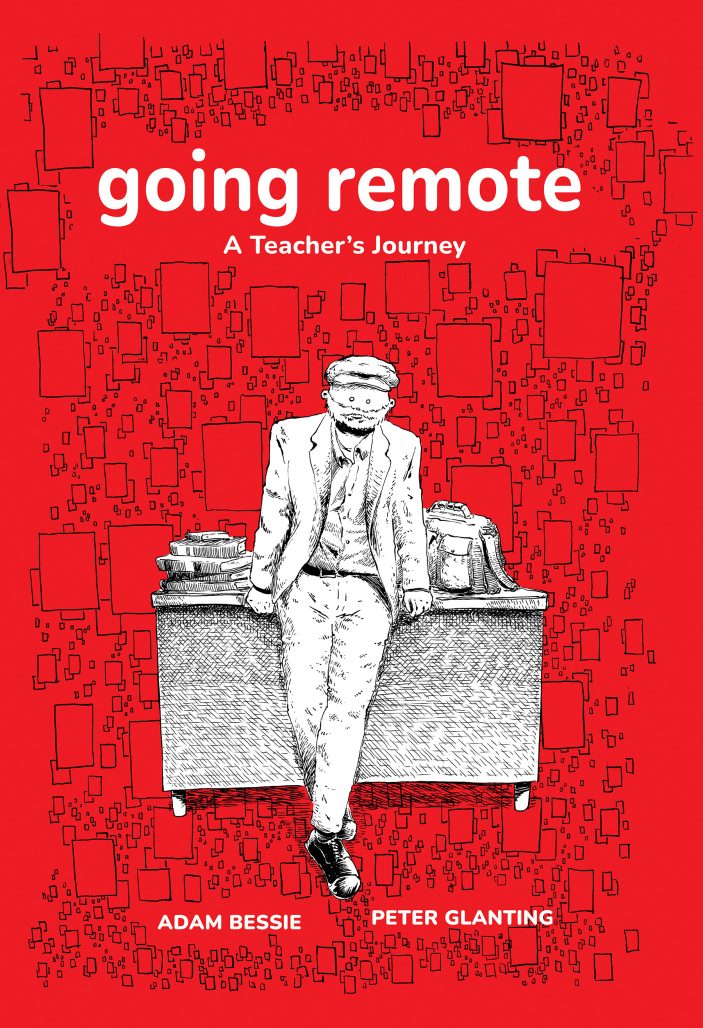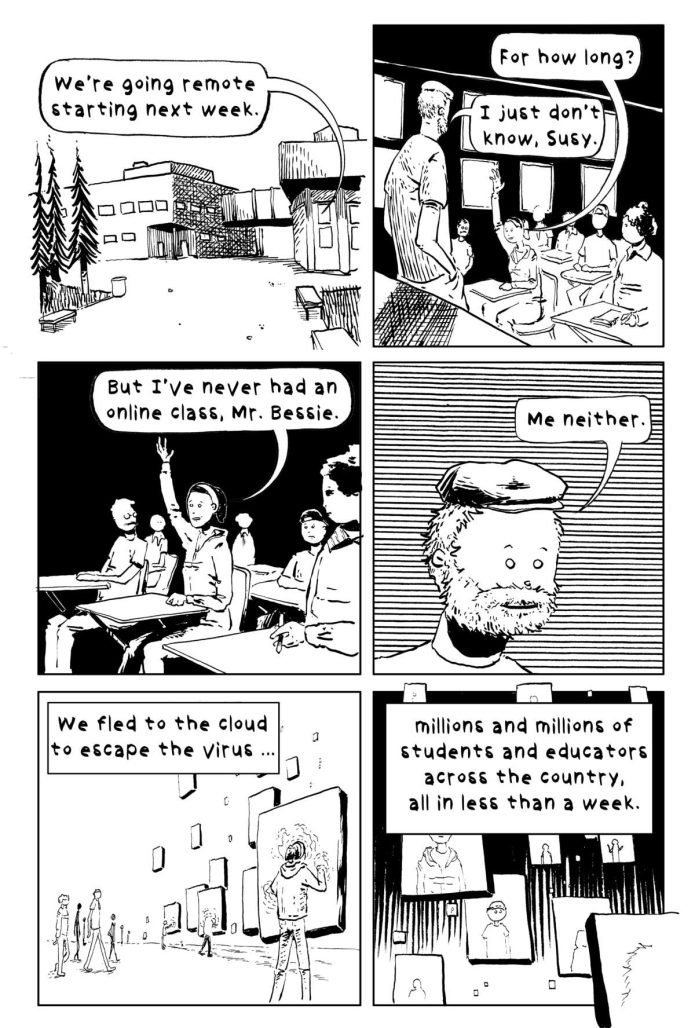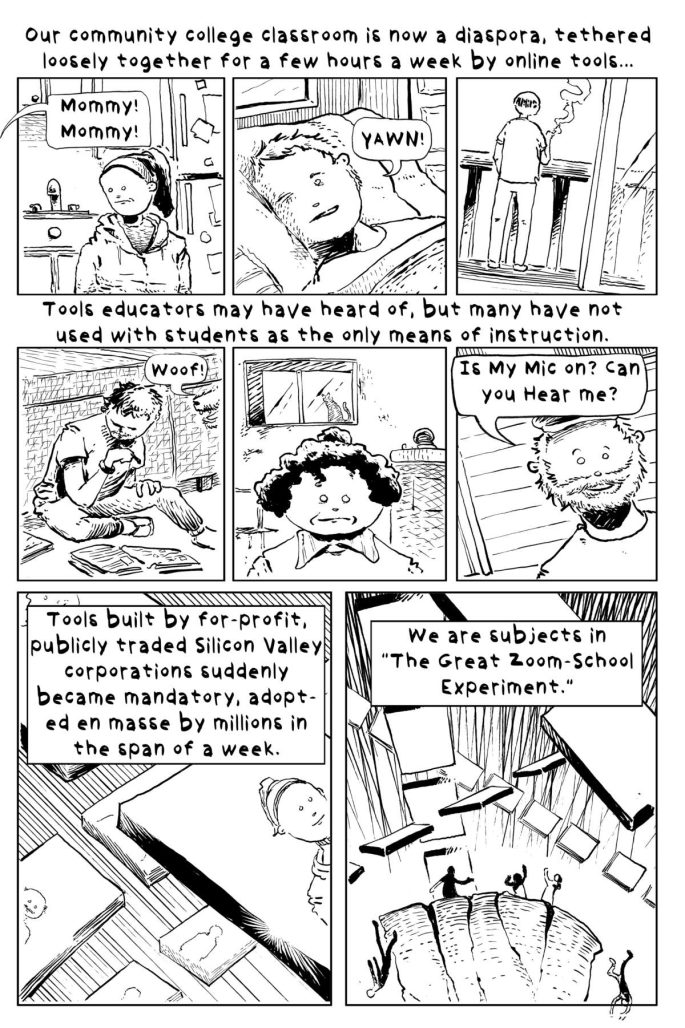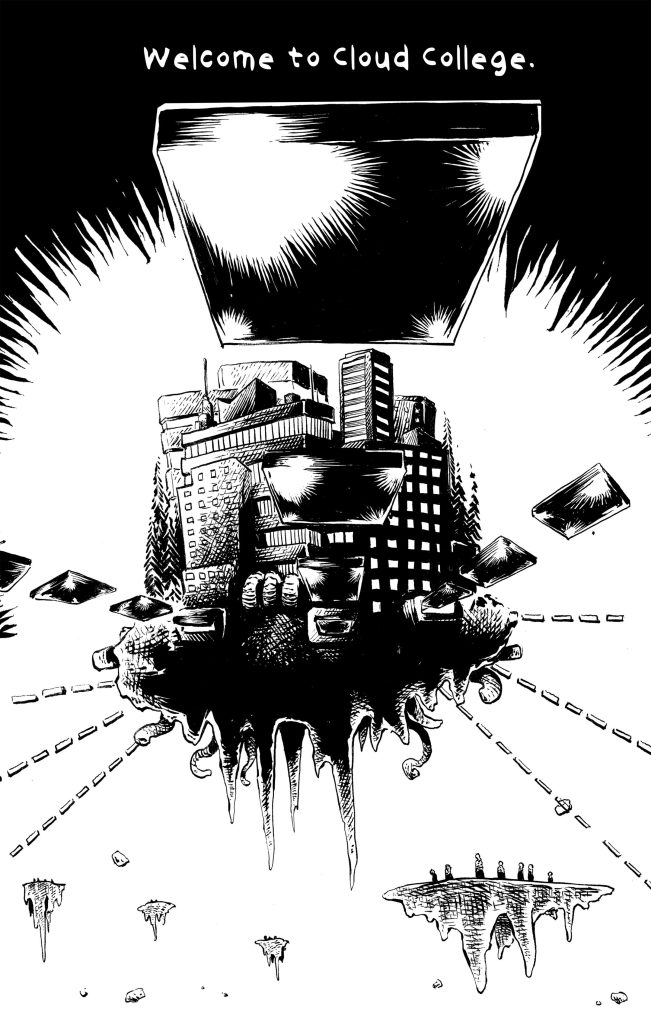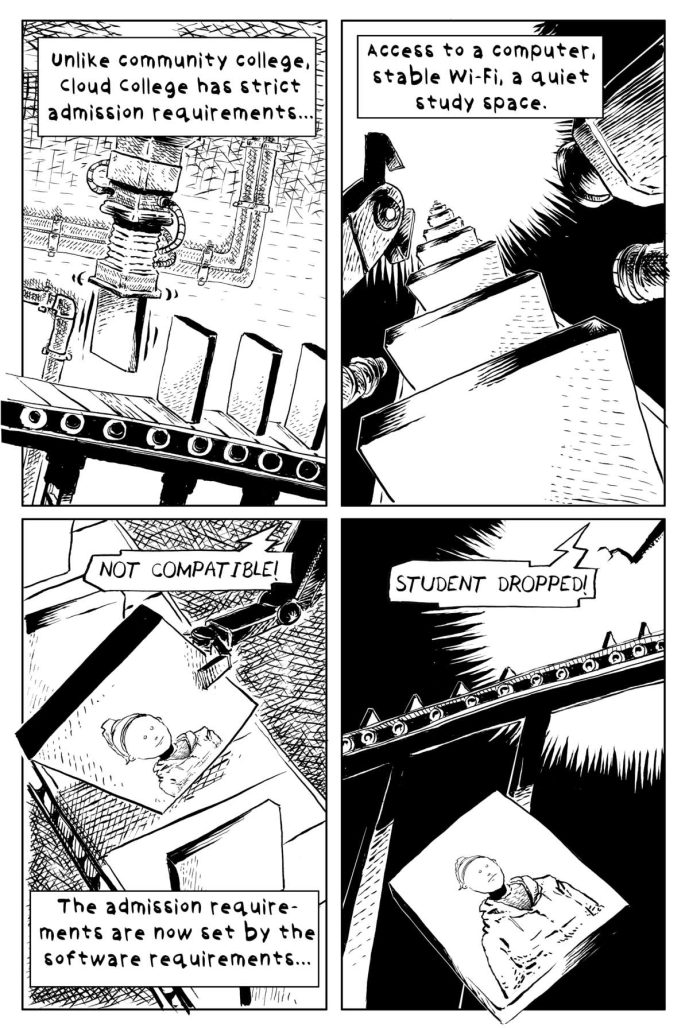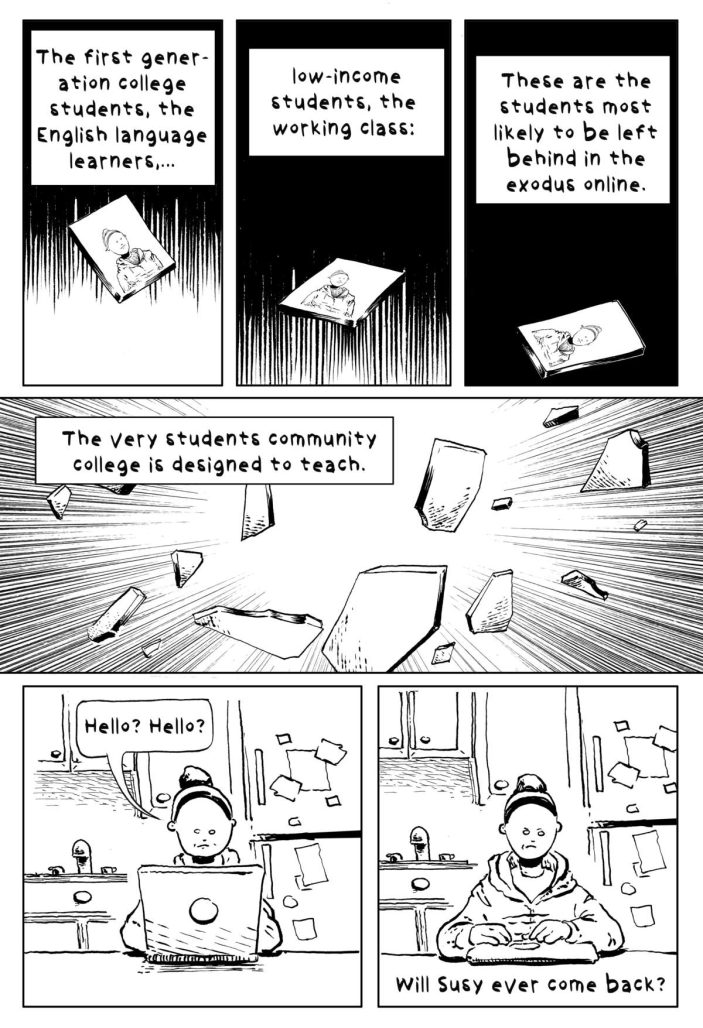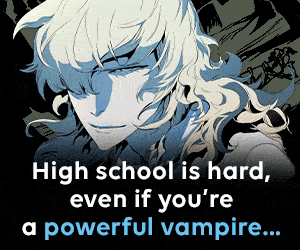It has been three years since the COVID pandemic began, and a generation of students are still struggling to recover academically. What had been the great equalizer—the classroom, which allowed students from diverse socio-economic backgrounds to socialize together—had suddenly been taken away when schools closed. What was left in the aftermath was an imperfect replacement for the classroom. Not only did the COVID pandemic disrupt those students’ academic trajectories, but it heightened economic disparities which reverberate to this day. This was the environment in which Adam Bessie found himself, and which he details in his seeringly honest debut graphic novel, Going Remote: A Teacher’s Journey, which was released in May 2023. Bessie had just returned to teaching after battling cancer, only to face a new enemy in pandemic-forced isolation and the struggle to find community through the anesthetic confines of a computer screen. The artwork by Peter Glanting is haunting, moving between cinematic dystopia and Bessie’s elegiac yearnings for normalcy.
In a conversation with The Beat, Bessie reflected on the aftermath of remote learning and isolation, illness and an uncertainty of the future, and on Going Remote as his anthem to community college teaching, comics, and the intersectional realism of science fiction.
Nancy Powell: Congratulations on the release of the book! How has reception been for Going Remote?
Adam Bessie: Thanks so much for having me! It’s an honor, and I’ve been surprised by how my very personal and vulnerable work has connected with so many. It’s been a lovely and unexpected journey, especially as I didn’t intend for Going Remote to be a full-length book when I started it three years ago, right at the onset of the pandemic. I wrote the initial Going Remote chapter as a stand-alone graphic essay with Peter, my artistic collaborator, as we all went remote: I had never had an online class (nor had most of my students), and would have to hold up this class in this moment of crisis, all while grappling with my private struggles long-term brain cancer survivor. And so, Going Remote began as comics treatment, a narrative therapy, a Graphic Medicine to soothe my own soul, and in doing so, I hoped it would connect with others – especially students, teachers, and those living with serious illness. I was so grateful to have finished the book at all. And then, to have such positive feedback – especially from students – has been more than I could have hoped for!
Powell: Have you received any reactions from former students?
Bessie: Yes! This has been my favorite part of the publication, as a number of current and former students have reached out, and said they felt seen in work. This is key, as community college students are often invisible, and when they are made visible, are the butt of jokes, such as in the NBC show Community. But through my years of working alongside these students who truly come from all walks of life, I’ve seen their profound strength, resilience, creativity, often in the face of significant barriers. My biggest concern was that despite my best efforts, I wouldn’t be able to fully capture the spirit of my students, and what I’ve seen them go through during the pandemic – which impacted our populations significantly. And so to hear that the work represented some of their experience has meant the world.
Powell: What provoked you into putting your experiences onto the written/visual page?
Bessie: I didn’t think about doing it any other way than comics, as I’ve been writing non-fiction comics for over a decade on education, illness, and technology – which Going Remote pulls together into a single story. I love writing about real life in comics for the same reason I love teaching community college – that both can be accessible for a wide range of folks. Comics are ideal for rendering the invisible visible, making abstract issues, invisible conditions and emotional states a concrete reality for readers.
For example, in Going Remote, we are able to take the complex and abstract reality of remote schooling and compress it into a single compelling page long image of Cloud College. And later, when I’m attempting to express the pain of receiving an email from a student attempting suicide, we render it as the words of the email punching a hole through my chest. I just feel that I can capture the reality of my experience better in comics than any other medium.
Powell: How has teaching in community colleges changed since the pandemic?
Bessie: That could be the subject for a sequel to Going Remote! Teaching community college has changed profoundly since we went remote in March 2020, and I don’t think there is any going back to BC (Before Covid). In some ways, I’ve felt like a new teacher over the last year, as the job has changed so profoundly – in some exciting ways, and some discouraging ones.
On the positive side, it’s been reinvigorating to be back in the physical classroom, as students are craving community, and remaking it in new ways that merge the Cloud and the ground. I’ve seen the electricity in the classroom come back – some days. But on the other side, we are still a community in crisis. We are grappling with the fallout of the pandemic – with a massive loss to our community, both students and teachers, who have left and never returned. Enrollments are still far below pre-pandemic levels. And for the students who are left, we are seeing a mental health crisis, one which had roots before the pandemic, but is now much more prominent. I find myself fielding multiple emails per week about dealing with crisis, be it mental health, housing, and much more.
Powell: The term “remote” has so many meanings. Not only is there the technological context, but there is also the distance it creates between human interaction and educational opportunity. I love how you tied these two meanings together. Can you talk about some of the inequities that persist post-pandemic and what efforts community college leaders took to redress them, if any?
Bessie: When the pandemic descended on us, I hoped that this exodus into remote education would ultimately draw us closer – in the long run. I hoped that this moment of crisis would inspire a student and teacher-led movement to demand a better community college, one that better addressed the existing inequities of race, class, gender-identity, immigration status, and disability. But in truth, this change hasn’t yet happened. Even though my students are some of those most impacted by the pandemic personally and academically, even though they have an even greater need than before the pandemic, I don’t see any major efforts by political leaders to respond to the crisis in community colleges.
In fact, it’s almost as we are just returning from a vacation, pretending as if we all didn’t just go through a collective trauma, one that has changed all of us. But unfortunately, those with the most power over our colleges, those who make the decisions, are most removed from our classrooms, most removed from the students, most removed from the on the ground realities. That’s why I hope our book inspires others from community college to share their stories – so that those in power are compelled to act.
Powell: Did you find getting back to normal after the pandemic difficult? And are students returning to the classroom or have Zoom classrooms become the new normal?
Bessie: Yes, re-entry has been challenging for all of us – myself included. Even though I’d been a classroom teacher for many years, coming back to a physical class after nearly two years in Cloud College was far more difficult than I imagined. After two years of sitting at a computer in my teaching garage, it was as if my classroom muscles had atrophied. And of course, the same has happened for many of my students, who have spent far less time in the classroom than I – and for some, they have never actually set foot on a college campus or taken a college class in person. It’s actually completely new for them. And in a way, it’s been new for me, even after all these years. I need to adapt to where students are, using the remote technologies in face-to-face spaces, along with responding to the learning loss, the emotional challenges, and much more. And so, it’s not so much a “return” to normal, but a collective re-inventing of the classroom.
Powell: What was it like working with your artistic partner, Peter Glanting? Did he get the science fiction references you included in the script?
Bessie: Peter and I have a wonderful collaborative relationship, which we hope can provide a model for other writer/artist groups working in non-fiction/memoir – which is why we have a Q/A section at the end of the book explaining our process. In short, it’s like a two-man band, in which we strive to create a harmonic experience on each page visually and narratively. This harmony hinged on our creative relationship, one built on mutual respect, and extensive communication – via ZOOM, ironically!
Powell: Did the illustrations, especially of the ghostly quality of the campus during the pandemic, come out the way you envisioned it?
Bessie: Yes, even better than I pictured! Ghostly is just the right word – that’s what we were going for. To not just show an empty campus, but to capture my feeling that the campus was full of this emptiness, full of the absence of the throngs of students that I was used to seeing before the pandemic. The emptiness here is a presence, a haunting, right than just empty space.
Powell: Who are the influences in the work you do and write about?
Bessie: Sci-fi icon Octavia E. Butler is a key inspiration – I’ve read almost all of her work and taught her novels and short stories. As a teacher, I admire her ability to explore complex ideas relevant to my students’ lives – race, class, disability, and more – into accessible and engaging storytelling. When the pandemic semester happened, I was teaching two of her iconic stories: “Bloodchild” and “Speech Sounds.” If you haven’t read her work, stop reading this now and check out her short story collection Bloodchild and Other Stories. Also, the graphic adaptations by John Jennings of Kindred and The Parable of the Sower are worth picking up!
Powell: Which science fiction shows of late post-pandemic have had the most impact on how you view teaching?
Bessie: Severance on AppleTV+ (with Christopher Walken, Adam Scott and John Turturro) is a powerful and disturbing meditation on the future of surveillance capitalism which extends the themes in Going Remote to frightening, but possible places.
Powell: And if you could bring a science fiction series to the visual page, which would that be?
Bessie: I would love to adapt E.M. Forester’s 1909 sci-fi story “The Machine Stops,” which Peter partially illustrated in our book (and which you can find for free online!). In the story, humanity lives underground in bunkers for fear of the toxic air outside and communicates with each other only through screens – and all of the system is controlled by a sort of AI system, which everyone prays to as a god. It’s shocking that he penned the story in 1909, at the advent of the assembly line. Now that we have entered the AI age, I think “The Machine Stops” provides a timely warning about entrusting too much of our agency and decision-making to machine-intelligence.
Powell: What did the pandemic, remote teaching, and dealing with your personal health struggles teach you about yourself and the community around you?
Bessie: That going remote is easy. I don’t mean technologically, per se, but socially, psychologically, and spiritually. It’s easy to remove ourselves from community, to isolate ourselves in our own bubbles, to even remove ourselves from ourselves. In times of crisis such as we all lived through (and continue to), it’s tempting to wall off, to wall away, to shield ourselves in a protective bunker. It can be terrifying to make the other choice, the grounded choice: to be here, to be present, to be in ourselves, to be in community. It’s a risk to step outside our bunkers, be they in our homes, our schools, or our souls. But the risk is worth it. And if we’re going to make a humanistic change in our educational, medical, and political systems, we need to take that risk.
Published by Seven Stories Press and The Censored Press, Going Remote: A Teacher’s Journey is available in stores now.



